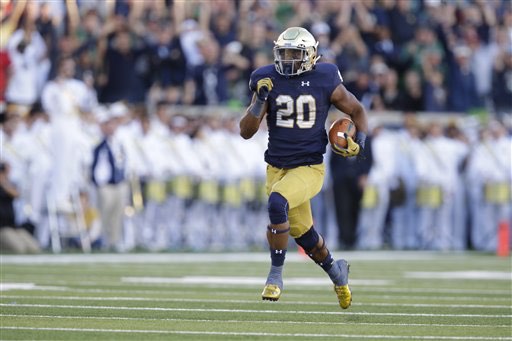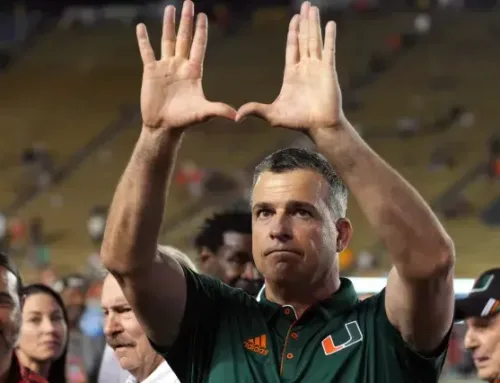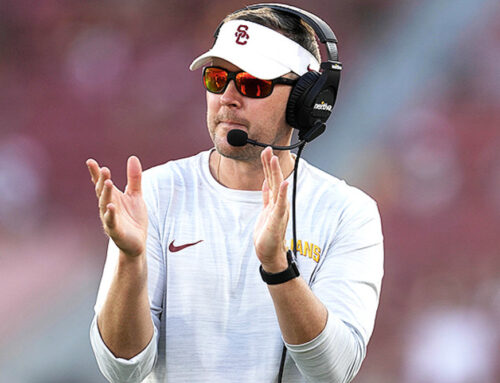The 2015 season brought three new major runners to the field and in some ways none of them were expected to have major roles. C.J. Prosise successfully made the transition from receiver, DeShone Kizer would become the starting quarterback early in the season, and Josh Adams quickly established himself as a trusted true freshman.
Run Success Definition
A play counts as a success if it gains 40% of yards on first down, 60% of yards on second down, and 100% of yards on third or fourth down. If the team is behind by more than a touchdown in the fourth quarter, the benchmarks switch to 50%/65%/100%. If the team is ahead by any amount in the fourth quarter, the benchmarks switch to 30%/50%/100%.
2015 Rushing Stats
Prosise, 157 attempts, 1,029 yards, 6.55 average, 11 TD
Adams, 116 attempts, 838 yards, 7.22 average, 6 TD
Williams, 21 attempts, 81 yards, 3.86 average, 1 TD
Folston, 3 attempts, 19 yards, 6.33 average, 0 TD
On the surface, the 2015 season was a very strong performance for the Irish on the ground. Let’s put it this way, did anyone expect Adams to break nearly every freshman school record and for Prosise to be a valued NFL Draft pick? Not even the biggest optimist predicted both of those outcomes.
Run Success (2015)
| Player | 1st/2nd + | 1st/2nd – | 3rd/4th + | 3rd/4th – | Total |
|---|---|---|---|---|---|
| Prosise | 80 | 69 | 3 | 5 | 52.8% |
| Adams | 68 | 43 | 1 | 4 | 59.4% |
| Williams | 11 | 8 | 2 | 0 | 61.9% |
| Folston | 1 | 2 | 0 | 0 | 33.3% |
Prosise Fades
There’s no doubt Prosise was a complete revelation in the beginning of 2015. He was the type of runner that so many thought George Atkinson III could develop into and Prosise did his own development at the position over night. Unfortunately, he faded pretty precipitously down the stretch prior to getting injured and ending his career with Notre Dame.
In fact, 45 of Prosise’s 80 successful runs on 1st and 2nd downs came in the first 4 games. He was super explosive and carrying a 63.0% overall success rate during those 4 games–truly elite stats at that point in the season.
After the first 4 games, Prosise finished with only 36 successful runs and dropped down to a 43.3% success rate. If he stays healthy who knows how much better he performs but the same issues befell him during his rookie season in the NFL. He looked pretty solid for the Seahawks but went down with a season-ending injury.
Adams Wise Beyond His Years
If you’re not impressed with Josh Adams prepare to be over the final three installments of this series. For anyone getting consistent carries over a full season season in the Kelly-era, Adams’ 2015 season is the 2nd best success rate for all Irish running backs behind Jonas Gray’s 2011 campaign.
It wasn’t all roses, though. Plus, Adams didn’t have to carry the load all season. The Virginia, Georgia Tech, Clemson, and Boston College games he had 50% or worse run success. In 6 separate games he had 5 or fewer carries.
However, Adams big-play ability was balanced with his consistency is what made him so good as a freshman. He obliterated UMass (11 successful carries to 2 unsuccessful) and finished strong with 20 successful carries and 10 unsuccessful carries against Stanford and Ohio State.
Dexter the Next Great?
This series should make it clear that small sample sizes are pretty meaningless. Dexter flashed pretty well against UMass (6 successful to 1 unsuccessful) and only had 14 carries in the other 12 games. He did have 5 successful runs against Texas which was a positive first game.
Of course, the injury to Folston in the opener will always leave us with a lot of “what if” scenarios. As I mentioned in the previous installment I believe Folston was the type of back who had a low floor and not a super high ceiling. He would’ve offered a lot of help once Prosise got banged up in the middle of the season but in some ways the offense really benefited from C.J. and Adams getting the bulk of the work.
Other Fun Notes
Clemson and Temple were the two teams that really put the screws in the Irish running backs. In these two games the tailbacks had just 8 successful runs to 23 unsuccessful runs.
Prosise started the Clemson game with 6 straight unsuccessful runs.
The 2015-16 seasons are significant because of the uptick in running from the quarterback position. You can imagine how things would’ve progressed had Malik Zaire stayed heatlhy. In just over 1.5 games he totaled 17 carries!
No one thought Kizer would run the ball THAT much in comparison to Zaire but the Irish weren’t shy about using the former, particularly in short-yardage. Notre Dame had 62 rushing attempts on 3rd or 4th down for all of 2015. Check above and the running backs got 15 of those carries, a stat nearly cut in half from 2014.
The Irish quarterbacks received 36 of those carries! Zaire was successful on 1 out of his 3 carries, Kizer 17 for 27, and Wimbush 2 for 3.
In total, the Irish quarterbacks had a 58.2% success rate on 134 rushing attempts during the 2015 season.
This season was a breath of fresh air, not because of the success rate, but rather it’s the only one of the entire Kelly era that saw a nationally prominent explosive ground game. The Irish finished tied for 22nd in the country in 20+ yard rushing plays and haven’t sniffed that high of a ranking before or since under Kelly.
The 2015 rushing game gained 241 more yards than the previous Kelly-era season high (2012) and was the second best overall run success rate but I think the explosiveness in particular made this season feel like it was by far the best ground attack since 2010.





That was so exciting. ND flirted with the playoffs almost the entire time.
The common trope among CFB coaches and analysts is that the teams who can run the ball well and stop the run well are always very successful.
Case in point: Notre Dame under Brian Kelly.
But not everyone agrees on the definition of “well” tough!
This is the entire crux of the Run vs Pass debate. I’ve seen a couple of articles that say pass defense is actually more highly correlated with success in college and the pros than run defense. The efficiency numbers anecdotally back that up (sorry not finding R^2). Here are all top 25 teams to be top 25 in any of the four categories of run/pass X off/def. Pass Off (10) Clemson, USC, Wash, OU, PSU, Ok St, WMU, VT, USF, Miami Pass Def (15) Clemson, Bama, Wash, tOSU, PSU, FSU, Wisc, Mich, LSU, UF, VT, CU, Miami, Louisville, SDSU Rush Off (10) Bama, tOSU, FSU, Stan, LSU, USF, Louisville, UT, Auburn, SDSU Rush Def (10) Bama, tOSU, Wisc, Mich, LSU, VT, Miami, Louisville, Aub, SDSU Here are the teams that were top 25 in both pass/rush offense and pass/rush defense (by YPP) last year and their final spot in the AP poll. Pass Boise State, Penn State (7), Warshington (4), Clemson (1), Miami (20), VT(16) Rush Louisville, LSU, SDSU (25), Alabama (2), Ohio State (6), Aub (24) This aligns with the advanced stats, which show passing is generally more efficient. Everything I have seen says that the strongest correlation to winning are Pass YPA-Off minus YPA-Def (CFB and NFL), and the difference in QB Rating (NFL). These are obviously very similar stats. There are numerous studies on this for NFL, thepowerrank.com is the only one I have read that looks at this for college, and I can no longer find it. The problem with ND under Kelly isn’t that he throws the ball too much, it’s that we don’t tend to do it well consistently. I think people see us not passing well so think we should run more, because everyone assumes we will do that well simply by doing it more. I somewhat agree in that I believe at the college level running is easier than passing. And simply running more, even if we are worse at it could help improve on a bad or mediocre season. But I don’t think it is anymore likely to put us in the playoff than a good passing game. In case anyone was wondering, Clemson was 95th in rushing YPA, we were 60th. There was only one top 25 team that was top 25 in both Rush and Pass Off, USF, so clearly being great at both isn’t that beneficial. And there was a pretty even balance between being in the AP top 25 if you were good at running vs passing. So basically, I don’t care if we have a great running offense or passing offense, as long as we are actually good at one of them. TL;DNR: Run vs Pass doesn’t matter on offense, as long as you do one well. But, CAN WE PLEASE GET SOME PASS DEFENSE???? Of the top 10 teams, 5 were top 10 in pass D. All but wildly overrated OU were in the top 40 in pass D. 5 were top 25 in both… Read more »
FYI, if you click Read More (if you are a glutton for punishment) it will break it into paragraphs.
Great stuff.
I go back and forth with this stuff. I think a run heavy spread is the “safest” bet for Notre Dame to be a consistently good team and program. But I cringe at the idea of a run-heavy offense more in the pro-style mold.
I see ND fans (mostly the cranky ones) always suggesting that we A) get a tall (and white!) game manager and B) simplify things for the quarterback.
Do I think Kelly makes thing too difficult for his QB’s? Maybe a little bit. But I’m under no delusion that ND is ever going to be an elite team without asking a ton from the quarterback position. Most especially when we don’t recruit defense at an elite level. Why wouldn’t you try to max things out on offense and at quarterback??
IMHO, college teams are setting themselves up for failure if they overrely on the QB. Unless you have a gamewrecker of a player (Cam Newton), you’re placing too much responsibility on a 20 year old in an error prone position.
Even in the NFL, I think you could make a similar argument. As a falcons fan I felt like I was watching a Brian Kelly coached game during the Superbowl. The Falcons had a fancy, historically good offense but just couldn’t seem to get it done when they needed to the most. It seems that a more reliable running game would have prevented the disasters like the strip sack or the holding penalty on third down that killed them. An overreliance on the passer seems to be riskier.
With our recruiting quality on the offensive line I just never understood why we haven’t prioritized reliability in the running game. It always seemed like a more attainable goal than QB perfection.
That may be true if over-reliance on the QB equals throwing the ball a lot.
Otherwise, I think there’s lots of wiggle room to rely on a quarterback at the college level. There’s a sweet spot where you can put a lot on your quarterback but still keep things simple enough that the offense continues to hum.
I think simply running the ball would help us be a more consistent team year in and year out, which I would love, but not an elite one.
Bama is the only team that has actually been able to compete for titles without an incredible QB, who handles a huge amount of the load. The only games Bama has lost in the past like 5-10 years, are ones where the other team’s QB has an incredible game. A team like Wisconsin is never beating Bama.